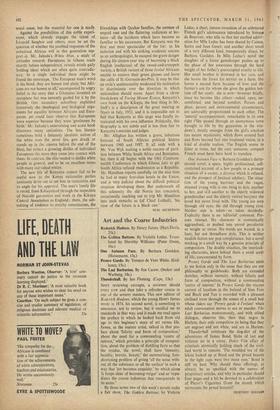Art and the Coarse Industries
One Autumn Face. By Barbara Goolden. (Heinemann, 15s.) Thunderball. By Ian Fleming. (Cape, 15s.) SINCE reviewing corrupts, a reviewer should every now and then take a refresher course in one of the severer masters. This new edition of Roderick Hudson, which the young Henry James wrote in 1874, his second novel, is something to announce, not to review, but it recalled me to standards in that way, and it made me read again the preface in which he looked back from old age to this beginner's story of art versus life. James, as the mature artist, talked in that pre- face about 'felicity and form of composition,' about the need for a commanding 'centre of interest,' which provides a principle of composi- tion, about the problem of distilling facts so that the residue, the novel, shall have 'intensity, lucidity, brevity, beauty,' the summarising, fore- shortening problem of giving 'all the sense with- out all the substance or all the surface' in such a way that 'art becomes exquisite,' by which alone 'it keeps clear of becoming vulgar' and so 'repu- diates the coarse industries that masquerade in its name.'
By those terms two of this week's novels make a fair show, The Golden Buttons, by Violette Leduc, a short, intense evocation of an unlettered French girl's adolescence introduced by Simone de Beauvoir, who tells us that her startled admir- ation for Mlle Leduc has been shared by Camus, Sartre and Jean Genet; and another short novel of a very different kind, transparently direct, by Barbara Goolden. In Mlle Leduc's novel the daughter of a forest gamekeeper pushes up to the phase of her awareness through the hard weight of her father's preoccupied cruelty to life. Her small brother is drowned in her care, and she leaves the forest for service on a farm. She leaves a second farm because of love and the farmer's son (to whom she gives the golden but- tons off her coat): she is now—however briefly, since we become like others—naked, open, un- comforted, and beyond comfort. Person and place, person and environmental circumstance, are admirably proportioned to each other. The 'natural' accompaniment, remarkable in its own right ('She passed through an anonymous town brought to life by the geraniums in the win- dows'), mostly emerges from the girl's emotion (no nature mysticism), which flows around fact and flows beyond fact into irrational vision, in a kind of double realism. The English seems to falter at times, but the curt, sensuous, compact French must have been hard to translate.
One Autumn Face is Barbara Goolden's thirty- second novel, a spare, highly professional, self- contained account of a few people in a primary situation of a career, a divorce which is refused, and the prospect of hesitant adultery. The situa- tion of the young barrister and the vague, misused young wife is one thing to him, another to her, and still another to the elderly widowed grandmother and the elderly retired barrister she loved but never lived with. The young are seen through old eyes, the old through young eyes. Neither side is taken—or taken decidedly. Explicitly there is no 'editorial' comment. Per- sons interact. No character is romantically aggrandised, or pushed into unreal peculiarity or weight or virtue. No words are wasted, in a bare, but not threadbare style. This is neither modish fiction nor pop complaisance, but a novel working in a small way by a genuine principle of composition. The double situation, the interlock- ing characters, leave behind them a small scent of life, concentrated by form.
Prenez Garde and The Last Barbarian seem to me fiction only in the sense that they are not philosophy or guidebooks. Both are extended sketches, without intensity, without felicity and form of composition, without a commanding 'centre of interest.' In Prenez Garde the viscous current of loyalism in the Ireland of Sinn Fein and Black and Tan is recorded with a pleasant civilised irony through the senses of a small boy whose elders say 'Prenez garde a !'enfant' when adult conversation moves to sex or murder. The Last Barbarian monotonously, and with stilted dialogue, observes this, then that, negro in Harlem, their only compulsive tie being that they are negroes and not white, and are in Harlem.
Thunderball continues the dog-dirt of the adventures of James Bond, blobs of lust and violence set in a corny, Dolce Vita affair of criminals atomically holding much of the civil- ised world to ransom. 'The moulded vee of the bikini looked up at Bond and the proud breasts in the tight cups were two more eyes.' Bond is still on heat. Why should these offerings, as always, be so speckled with the names of proprietary articles, and why in particular should four pages and a bit be devoted to a celebration of Player's Cigarettes (from the mouth which .surmounts the proud breasts)?
GEOFFREY GRIGSON


































 Previous page
Previous page